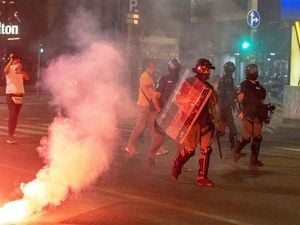Public transportation strikes are poised to disrupt services across Nordrhein-Westfalen (NRW) next week, as labor tensions escalate during wage negotiations. Scheduled to occur from February 10 to February 12, 2025, the strikes involve multiple transport companies, leaving thousands of commuters relying on buses and trains facing uncertainty.
The Verdi union has called for widespread strikes affecting cities like Bochum, Gelsenkirchen, and Recklinghausen. Affected services include major public transportation agencies such as Bogestra, Vestische, and the Herne-Castrop-Rauxel tram service (HCR). According to official announcements, the strikes will span entire days, commencing at service start for each company.
"We want to build as much pressure as possible before the next round," emphasized the Verdi spokesperson. This comment underlines the motivation behind the strikes, which are part of larger labor actions aimed at securing favorable outcomes for public employees, estimated at around 30,000 working within the NRW public transportation sector.
The most significant disruptions are anticipated on the first day of strikes, February 10, with substantial complications for commuters. Services will cease entirely for various transport agencies over this period. The Vestische transport company stated, "With all trips, the mobility guarantee and punctuality promise are canceled," indicating far-reaching consequences for passengers relying on their services.
More than a week prior to these planned strikes, there were already warning strikes across NRW's public transport system, creating significant cuts and impacting operational schedules for several cities. Commuters should prepare for challenges. Many took to social media discussing the potential repercussions expected with these interruptions.
Particularly hard-hit regions include the Ruhr area where cities like Herne, Bochum, and Recklinghausen will bear the brunt of the work stoppages. On February 10, Bochum commuters will see disruptions not only from Bogestra but also from Vestische services. Following swiftly, on February 11, cities like Oberhausen will also face delete or significantly reduced bus operations.
Highlighting the plight and necessity of organized labor action, Verdi's proposals include demands for eight percent wage increases but at least 350 euros more per month. "We need eight percent more pay, but at least 350 euros more per month," said union representatives, clearly outlining the stakes for workers involved. This demand reflects growing concerns over living costs and job security among public sector employees.
Negotiations between Verdi and the employers are expected to resume on February 17 and 18. Yet, with no significant progress toward agreement made earlier, union members show resolve not to relent without concrete commitments made on pay and working conditions. “Because of the high workload, employees should receive three additional days off each year,” emphasized a Verdi representative, calling attention to stressors contributing to the labor unrest.
While the strikes are set to impact many, alternative transportation options may remain available. Although private service providers like the Deutsche Bahn and certain regional rail lines have indicated they wouldn’t participate in the strikes, the public is urged to confirm individual schedules. Some transportation companies have stated, “Significant cuts” are expected on February 10,” prompting many to explore other commuting options or potentially adjust their travel plans altogether.
The strike's background is marked by yet another failed negotiation round on January 24, leaving union members frustrated. Previous actions have already caused substantial challenges and delayed commutes, which raises questions about the potential for continued actions as union strength is displayed through organized strikes.
Anticipation looms around the second round of negotiations. If previous discussions are any indication, the road to resolution remains laden with challenges. Yes, commuters can expect more than just potential day-to-day impacts—as these labor actions signify broader issues affecting the cultural and economic fabric of NRW.
All commuters traversing through NRW should remain updated with real-time information from local transit authorities and should plan accordingly to mitigate the inconveniences caused by the strikes. The impact of these labor actions not only signifies the immediate challenges for individuals affected but also shines light on the broader issues of labor rights and demands for recognition of work conditions within public services.



